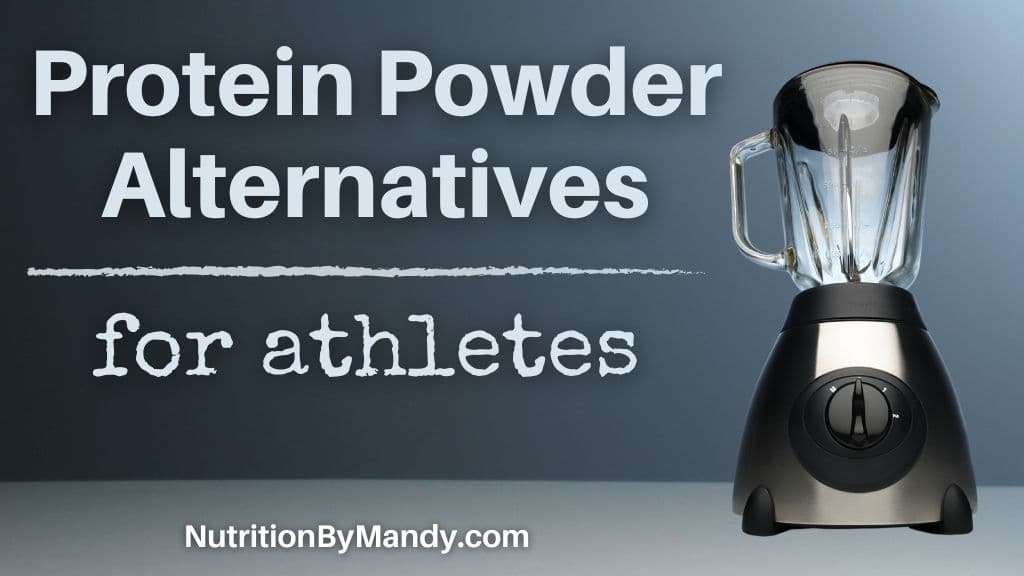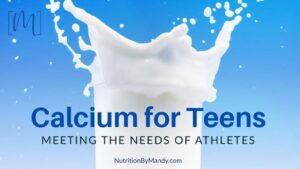Last Updated on January 4, 2026 by Mandy Tyler, M.Ed., RD, CSSD, LD
11 Protein Powder Alternatives for Athletes
As a sports dietitian, I am frequently asked for alternatives to protein powder that athletes can use in a shake to meet their protein needs.
Let’s explore 11 easy protein powder alternatives that I commonly recommend athletes include in a shake.
How Much Protein Should Athletes Include in a Shake?
Prior to discussing protein powder alternatives, it is first important to discuss the amount of protein athletes should include in a shake.
To get the most benefit from protein intake, athletes are encouraged to spread their protein intake throughout the day with meals and snacks. In addition, athletes should consume protein following a workout to support their recovery nutrition needs (1, 2).
It is recommended that athletes aim to consume ~0.3 grams of protein/kg of body weight at each eating occasion (1). This calculates to be in the range of 20-40 grams of protein (2), with larger athletes needing more protein than smaller athletes.
11 Protein Powder Alternatives for Athletes
One of the benefits of a shake is that it is an easy way to support athletes with meeting their daily protein needs.
Athletes can enjoy a protein shake with breakfast on-the-go, as a recovery drink following a run, or as an evening snack before bed.
Below are 11 simple ideas for boosting the protein content of a shake without the use of protein powder. By combining several of these ingredients in a shake, athletes can create a protein-rich drink that supports their nutrition needs.

#1 High-Protein Milk
Ultra-filtered, high-protein milk is first on the list of protein powder alternatives for athletes.
Ultra-filtered milks, such as Fairlife® or H-E-B MooTopia, are filtered to remove the lactose and contain a concentrated protein content. To provide a comparison, a cup of ultra-filtered milk has ~13 grams of protein, while a cup of regular cow’s milk has 8 grams of protein (3, 4).
Thus, adding a cup of high-protein milk to a shake is an easy way for athletes to increase the protein content of their drink.
Lactose Free Protein Powder Alternative
As an additional bonus, ultra-filtered milk is lactose free. Thus, it is a great, protein-rich option for those who are sensitive to lactose.
Pro Tip: Athletes wanting a chocolate shake can use chocolate ultra-filtered milk in their shake for a rich flavor. A chocolate cherry post-workout smoothie is one of my personal favorites.
#2 Greek Yogurt: Simple Protein Powder Alternative
Greek yogurt is another nutritious protein powder alternative for athletes. It is a simple way to boost the protein content of a shake and give it a creamy texture.
A 1-cup serving of plain Greek yogurt provides ~25 grams of protein (5). In addition to protein, Greek yogurt provides calcium and some brands are also fortified with Vitamin D.
Pro Tip: I like using a vanilla flavored Greek yogurt in my shakes and smoothies, which gives the drink a rich, creamy flavor.

#3 Cottage Cheese
In addition to Greek yogurt, cottage cheese is another convenient protein powder alternative for athletes. A 1-cup serving of cottage cheese provides ~28 grams of protein (6).
For athletes who are lactose intolerant, Lactaid® and Good Culture® both offer varieties of lactose-free cottage cheese that athletes can enjoy in their shakes.
Even if an athlete does not like the texture of cottage cheese, it blends well into a shake and is a great way to boost the drink’s protein content.
Protein Powder Alternative for Before Bed
I also like to point out to athletes that the main type of protein in cottage cheese is casein protein. Casein is a source of slow acting protein, taking longer for the body to digest. Thus, it is commonly recommended for athletes to consume casein protein before going to bed (2).
Adding cottage cheese to an evening shake allows for athletes to take advantage of its high casein content. This is one of my top bedtime snack recommendations for athletes.
#4 Skyr
Skyr is another protein-rich dairy product that athletes can use to boost the protein content of their shake. It has a thick and creamy texture making it a great addition to an athlete’s shake.
Skyr has traditionally been included as a staple in the Icelandic diet. Due to its high protein content, flavor, and texture is has been increasing in popularity worldwide (7).
Skyr is made through an ultrafiltration process, which gives skyr its texture and high protein content (7). A 5.3 oz individual container of skyr provides ~15 grams of protein, depending upon the brand purchased (8).
Icelandic Provisions® and Siggi’s® both offer a variety of skyr dairy products that athletes can try out.
#5 Nut Butter
Nut butters are a tasty way to add protein, healthy fats, vitamins, and minerals to an athlete’s shake. A 2-tablespoon serving of nut butter provides ~190 calories and ~7 grams of protein (9).
When selecting a nut butter, I encourage athletes to choose a product that contains minimal added ingredients. Some nut butters contain added sugars and hydrogenated oils, making them less healthy options for athletes.
Nut butter is calorie dense. Thus, it is a great addition to a high-calorie smoothie for athletes looking to gain weight.
Athletes who are not looking to gain weight can still enjoy nut butter in their shakes; they just should be mindful of the amount added to the drink.

#6 Powdered Peanut Butter: Lower Calorie Protein Powder Alternative
Powdered peanut butter is another convenient way for athletes to add protein to their shakes. PB2® is a popular brand of powdered peanut butter currently available at the store.
Powdered peanut butter is made by pressing roasted peanuts to remove the majority of their naturally occurring oils. The peanuts are then ground into a powder. The powdered peanut butter can then be used in recipes or reconstituted with water into a peanut butter paste (10).
Powdered peanut butter is a good option for athletes that enjoy the taste of nut butter in their shake, but want a lower calorie option. A 2-Tbsp serving of powdered peanut butter provides 60 calories and 6 grams of protein (11).
#7 Chia Seeds: Nutrient-Rich Protein Powder Alternative
Chia seeds are a simple way to boost the protein content of an athlete’s shake. In addition to protein, chia seeds and flaxseeds provide fiber, omega-3 fatty acids, vitamins, minerals, and antioxidants (12).
A 1-ounce serving of chia seeds provides ~5 grams of protein along with 10 grams of dietary fiber (13).
Chia seeds have a mild flavor. Thus, they are an easy way to increase the nutrient content of the shake without altering the taste of the drink
In addition, chia seeds have the ability to absorb liquid. When added to a shake, the chia seeds will give the drink a thicker consistency.

#8 Dry Milk
Non-fat, dry (powdered) milk is a simple, economical way to boost the protein content of an athlete’s smoothie. A ¼ cup serving of dry milk provides 8 grams of protein (14).
In addition, dry milk provides calcium and many brands are fortified with Vitamin D. Calcium and Vitamin D are both key nutrients that are necessary to support optimal bone health.
Athletes should be mindful that regular dry milk contains lactose. Thus, athletes who are lactose sensitive will want to choose another option for boosting the protein content of their shake.
#9 Plant-Based Greek-Style Yogurt
Athletes following a vegetarian or vegan diet can consider using plant-based Greek-style yogurts in their shakes.
Plant-based Greek-style yogurts have a higher protein content than traditional plant-based yogurts. Silk® and Kite Hill® both offer plant-based options athletes can include in their shakes to boost the protein content.
I recommend that athletes review the nutrition facts label when purchasing plant-based yogurts, as protein content can vary widely between products.
#10 Silken Tofu: Plant-Based Protein Powder Alternative
Silken tofu is another plant-based option that athletes can add to their shakes to boost the protein and nutrient content. Tofu is made with soy milk and contains soy protein.
Unlike most sources of plant protein, soy protein is a complete protein. A complete protein contains all 9 of the essential amino acids, which our bodies cannot produce (15).
A 3-oz serving of silken tofu provides ~ 5 grams (depending on the brand) of soy protein (16). Tofu has a mild flavor and will not alter the flavor of the smoothie.
Pro Tip: Adding silken tofu to a shake gives the drink an extra creamy texture, which many athletes enjoy.

#11 Rolled Oats
Finally, rolled oats can be a great whole grain addition to a shake. The oats will make the shake thicker and give it a slightly “oaty” or “nutty” flavor.
A ½ cup serving of old-fashioned rolled oats provides 5 grams of protein (17). In addition to protein, rolled oats will also increase the carbohydrate, fiber, vitamin, and mineral content of the shake.
When choosing oats, I recommend selecting old fashioned rolled oats rather than steel cut. Steel cut oats have a firmer texture; thus, they do not blend as well into a shake.
Pro Tip: For an added boost of protein, consider trying the Bob’s Red Mill® Protein Oats in a smoothie. Their protein oats provide 10 grams of protein per 1/3 cup serving. Best of all, they contain one single ingredient – whole grain rolled oats.
11 Protein Powder Alternatives for Athletes
You are now set with 11 protein powder alternatives for athletes. As a reminder, athletes can combine a variety of these items together in a shake to create a drink that meets their protein needs.
For additional sports nutrition tips, make sure to check out my blog on healthy food substitutions for athletes.
Join the Nutrition By Mandy Email List & Get a Free High Calorie Smoothie Recipe
Click HERE to join the Nutrition By Mandy e-mail list. When you join you will receive a free high calorie smoothie recipe to download and enjoy.
About the Author
Mandy Tyler is a Sports Dietitian Nutritionist in the San Antonio, TX area. She is a Registered and Licensed Dietitian, a Board-Certified Specialist in Sports Dietetics, a Licensed Athletic Trainer, and is a Certified Exercise Physiologist through the American College of Sports Medicine. Mandy has experience working with athletes at the high school, collegiate, and professional levels. She believes the key to reaching one’s full potential, both in everyday life and in sports performance, relies on a healthy nutritional foundation.

If you are looking to take your performance to the next level, make sure to check out my new Sports Nutrition Game Day Guide. This downloadable guide is written to help athletes develop an individualized plan to achieve peak performance on game day.





